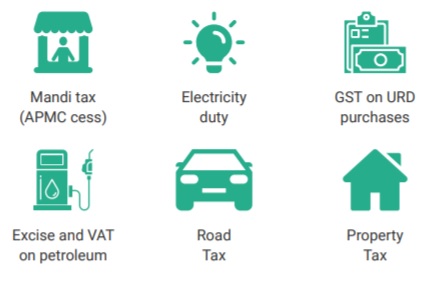We are pleased to present the latest edition of Tax Street – our newsletter that covers all the key developments and updates in the realm of taxation in India and across the globe for the month of June 2020.
- The 'Focus Point' covers a brief synopsis of the Remission of Duties or Taxes on Export Products(RoDTEP) Scheme.
- Under the 'From the Judiciary' section, we provide in brief, the key rulings on important cases, and our take on the same.
- Our 'Tax Talk' provides key updates on the important tax-related news from India and across the globe.
- Under 'Compliance Calendar', we list down the important due dates with regard to direct tax, transfer pricing and indirect tax in the month.
We hope you find our newsletter useful and we look forward to your feedback. You can write to us at taxstreet@skpgroup.com. We would be happy to hear your thoughts on what more can we include in our newsletter and incorporate your feedback in our future editions.
Warm regards,
The Nexdigm (SKP) Team
RoDTEP scheme – A new way to incentivize exports by eliminating the scourge of embedded taxes in the supply chain
Boosting merchandise exports has always been a focus area of the Indian government. Besides being zero-rated under the GST law, schemes under the foreign trade policy (FTP) such as Advance Authorization (AA), Export Promotion Capital Goods Scheme (EPCG), and Merchandise Exports From India Scheme (MEIS) also incentivize exports.
Last year, several of these export promotion schemes came under the radar for violating global trade norms. The United States argued that these schemes render benefits conditional upon export performance and therefore are prohibited under the Agreement on Subsidies and Countervailing Measures (SCM Agreement). The Dispute Resolution Panel (DRP) of the World Trade Organization (WTO) passed a ruling against these schemes (including the MEIS scheme). Even though India has appealed against this order hoping to get it reversed, the sword hanging over these schemes, especially the MEIS scheme, has made the search for its replacement an urgent matter
Against this backdrop, Finance Minister Nirmala Sitharaman announced the introduction of a new scheme called the Remission of Duties or Taxes on Export Products (RoDTEP) scheme for exporters, which is slated to replace the existing MEIS scheme. On 13 March 2020, the Union Cabinet chaired by Prime Minister Narendra Modi has given its approval for introducing this scheme. It is worthwhile to note that unlike the current schemes which allegedly provide subsidies to exporters, the RoDTEP scheme would reimburse embedded taxes and duties already incurred by exporters
Despite several taxes being subsumed under GST, many still persist, such as taxes on petroleum, electricity duties, mandi cess, etc. burdening the exporters. The fundamental principle of the RoDTEP scheme is that it shall seek to nullify this burden of embedded taxes in the supply chain, thus achieving true 'zero-rating' of exports when combined with measures such as Duty Drawback and IGST refunds. As all countries are allowed to zero-rate exports, the new scheme shall achieve the twin objective of incentivizing exports while being compliant with global trade rules.
In this month's focus point, we are going to discuss the nittygritty of this scheme, some practical issues, key action points, and how all exporters should leverage this opportunity to maximize benefits under the RoDTEP scheme.
What are Embedded Taxes?
Various taxes, cesses, and duties persist in the supply chain of exported goods despite the introduction of GST. Some of these taxes are allowed as credit, while others form part of the cost of production. Such taxes are known as 'embedded taxes.' For instance, excise and value-added tax on petroleum, coal cess, mandi tax, electricity duties, GST on URD purchases, and taxes on vehicles.
Some of the embedded taxes are illustrated below –

To read the full article click here
Originally published 13 July, 2020
The content of this article is intended to provide a general guide to the subject matter. Specialist advice should be sought about your specific circumstances.
